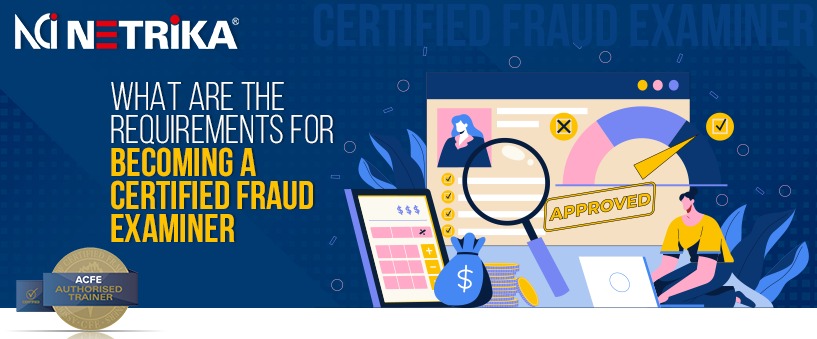If you work in compliance, risk, audit, investigative, financial, or legal responsibilities within an organisation, or if you have first-hand knowledge in these areas, a CFE can be an excellent resource in assisting you in acquiring a varied set of skills to contribute to the global fight against fraud. Individuals who pass these exams become members of the ACFE, receiving access to invaluable fraud insights, events and networking opportunities, world-class training, and a full range of support materials and career guidance.Read more.
You must have at least two years of professional experience in a field related to the detection or deterrence of fraud. At the time you are certified, you must have at least two years of professional experience in a field either directly or indirectly related to the detection or deterrence of fraud.
The Procedure for Becoming a Certified Fraud Examiner
While different educational and occupational courses may lead to CFE certification, the following are typical professional steps:
A bachelor’s degree from an accredited college or university in accounting, business, finance, economics, psychology, sociology, criminal justice, and/or computer science is required. Professionals from a number of areas may be considered, however, because the ACFE does not require a major. If they complete the other qualifications, those with no formal education may be qualified for the ACFE exam certification.
A professional background in at least one of the fields related to fraud investigations, such as accounting, finance, banking, law enforcement, and computer forensics, or a master’s degree in fraud investigation, forensic accounting, digital forensics, financial crime management, or another related field.
Candidates must become members of the ACFE, an independent organisation that maintains and administers the Certified Fraud Examiner (CFE) credentialing scheme, provides anti-fraud training, and develops recommendations for conducting effective fraud investigations.
To prepare for the CFE certification exam, take the CFE Exam Prep Course and/or the CFE Exam Review Course.
Complete the exam in the allotted time (8 hours spread over 60 days) and receive a 75% or better passing mark
Follow the CFE’s Code of Professional Ethics.
Through the ACFE or Netrika websites, applicants can register for membership and enrol in ACFE courses. Candidates must complete a number of steps in the application process in order to register. CFE exam expenses, qualifications, experience and character, and a signature statement are the four components of the online application. Candidates must offer proof of their education and job experience. ACFE India also requires a recent photo and three professional recommendation letters. Users will receive a confirmation email within 5-7 days of completing their application.
ACFE India recommends that applicants submit their applications at least 30 days prior to the exam date.
Skills required to become a certified fraud examiner in India
CFE-certified fraud examiners are organisations’ first line of defence against the threat of organisational level fraud. This demanding undertaking demands a wide range of inquiry skills for obvious reasons.
You may be at the beginning or conclusion of your career as a competent fraud examiner, but learning the art of fraud examination is a lifetime process that requires the following qualities.
Attention to Detail
Given the number of data and employees to monitor, fraud investigators must pay great attention to every detail. One unnoticed detail could be a game changer for the entire endeavour. As a result, every CFE certificate holder is required to be aware of the shady aspects of speech. They must be able to interpret what is stated or written, as well as what is not expressed but transmitted via behaviour.
Integrity
Because a CFE certificate holder must testify in court, the fraud examiner must be truthful in their work and maintain the highest level of integrity.
Objectivity
Making objective judgements is a fundamental characteristic of a CFE certificate holder. This implies that a fraud examiner not allow personal biases or conflicts of interest to obstruct their investigation.
Capabilities for Problem Solving
How can a fraud examiner hope to uncover a fraud if they lack analytical problem-solving abilities? A CFE certificate holder is expected to assess financial data accurately, understand financial linkages, and discover deviations. The entire technique is as hard as it sounds, and critical thinking abilities are required for professional success.
Patience
What useful are a fraud examiner’s skills if their work method is impatient? Fraud investigation is a time-consuming task that necessitates interviewing a large number of employees and handling enormous amounts of data; patience is what keeps a CFE licence holder productive at their job.
What role does Netrika play in supporting you in building a well-defined strategy for becoming a certified fraud examiner?
Netrika has collaborated with ACFE to develop India’s first CFE (certified fraud examiner) training programme. We are committed to reducing commercial fraud worldwide and increasing public trust in the profession’s honesty and neutrality. Our specialists combine the most cutting-edge business concepts with hands-on training to give a comprehensive plan for identifying and mitigating insider threats.
Our CFE certificate programme gives participants worldwide professional recognition and prestige, as well as greater marketability and employment stability. Netrika’s instructor-led CFE training course equips and promotes awareness for both professionals and companies in order to thwart potential frauds and reduce the danger of existing ones.


